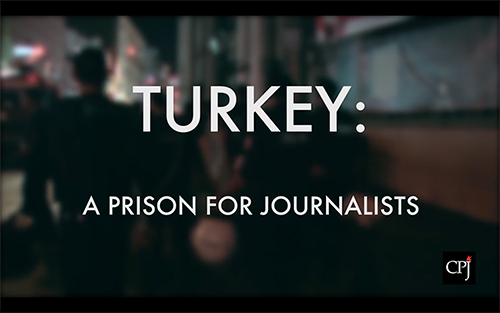CPJ calls on Venezuela to stop obstructing the foreign press
São Paulo, February 13, 2017–Two Brazilian journalists investigating a continent-wide corruption ring were detained over the weekend in Venezuela, according to press reports. Separately, Venezuelan President Nicolás Maduro announced at a rally that he wanted CNN out of the country and accused the network of spreading “fake news,” other outlets reported.

Turkey’s crackdown propels number of journalists in jail worldwide to record high
At least 81 journalists are imprisoned in Turkey, all of them facing anti-state charges, in the wake of an unprecedented crackdown that has included the shuttering of more than 100 news outlets. The 259 journalists in jail worldwide is the highest number recorded since 1990. A CPJ special report by Elana Beiser

Journalists covering Venezuela tension face violence, obstruction
Bogotá, Colombia, October 27, 2016–Journalists trying to cover rising political tensions in Venezuela have been obstructed and have come under attack, including by Venezuelan security forces and immigration officials, according to press freedom groups and news reports.

Venezuelan journalist arrested after reporting on protest
Bogotá, Colombia, September 7, 2016–Venezuelan authorities should immediately release online and radio journalist Braulio Jatar Alonso, the Committee to Protect Journalists said today. Domestic intelligence officers detained Jatar on September 3, a day after he reported on an anti-government protest.
International journalists denied entry to Venezuela before September 1 protest
New York, August 31, 2016–Authorities in Venezuela denied entry to at least six journalists, including CPJ Andes correspondent John Otis, who were traveling to the country to cover a protest tomorrow demanding a recall referendum on President Nicolás Maduro. Authorities said the journalists did not have the proper documentation to enter the country to work,…

Newspaper offices shot at and vandalized in Venezuela
New York, August 31, 2016–Authorities should investigate incidents of vandalism of Venezuelan newspaper offices and do everything in their power to ensure that journalists can work without fear of reprisal, the Committee to Protect Journalists said today.

Journalists attacked, equipment stolen during protests in Caracas
New York, June 3, 2016–Several journalists were attacked and some had equipment stolen while covering protests in Caracas Thursday, according to news outlets and a local freedom of expression group. Some of the journalists who were attacked said that the Venezuelan National Guard did not intervene to prevent the attacks and in one case, forced…
Venezuelan government newsprint squeeze forces newspaper to stop printing
Bogotá, March 18, 2016 – Blaming the refusal of the government to sell it newsprint, the independent Venezuelan daily El Carabobeño printed its final edition on Thursday, according to news reports. The newspaper has published for 82 years and was one of the few independent media outlets in Valencia, the capital of Carabobo state.
Venezuelan editor sentenced to 4 years in prison for criminal defamation
Bogotá, Colombia, March 11, 2016–A Venezuelan judge today sentenced David Natera Febres, the editor of an independent newspaper that investigated corruption at a state-run mining company, to four years in prison for criminal defamation, according to news reports.
